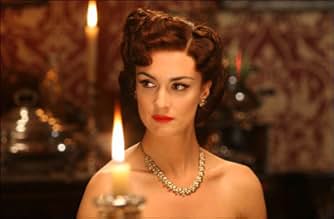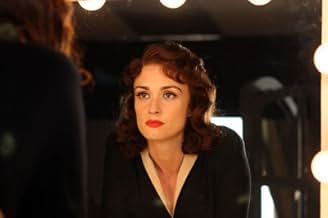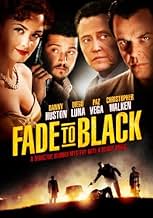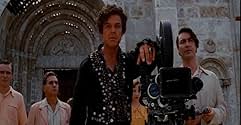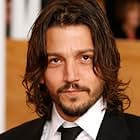Attempting to recover from his failed marriage to Rita Hayworth and restart his career, Orson Welles travels to Italy only to be drawn into a dangerous web of intrigue, murder and politics w... Read allAttempting to recover from his failed marriage to Rita Hayworth and restart his career, Orson Welles travels to Italy only to be drawn into a dangerous web of intrigue, murder and politics when an actor is murdered on his set.Attempting to recover from his failed marriage to Rita Hayworth and restart his career, Orson Welles travels to Italy only to be drawn into a dangerous web of intrigue, murder and politics when an actor is murdered on his set.
- Director
- Writers
- All cast & crew
- Production, box office & more at IMDbPro
Featured reviews
It's cleverly made and very funny. I loved the playfulness which nodded at Welles's work without doing anything as crass as obvious references. It's an enjoyable story. Not a great thriller, the insights and revelations weren't surprising but that only made it more real and engrossing.
Huston was encouraged to do part Orson and part his Father, John. He's a likable, believable hero matched by a good, mainly Serbian cast. Paz Vega is excellent as the heroine and Diego Luna gives a wonderful turn as the second hero to Welles, reminds me of James Macavoy, only likable.
First of all, Danny Huston, although an otherwise serious professional, doesn't seem extremely interested in depicting Orson as he really was, and his own voice more closely resembles (obviously) more that of his deceased father John, than that of Orson Welles.
May I remind you that Welles had a very incisive and commanding voice of a bass-baritone quality that Danny Huston simply cannot reproduce.
But this was royally ignored by the producers of this little movie when they decided who to cast for the role.
So be it.
Nevertheless, and despite being this just a fictionalized account of what really happened in those years to the real Orson Welles, which indeed would in itself, have made a much more interesting and fleshed out story than this, the entire film is actually more boring than interesting in any form or shape.
Even the supporting actors seem more bored than actually fascinated by the script they were handed out and some are even just acting by the numbers.
This entire exercise is just academic at best, but doesn't have any true quality to it except for its mysterious title, which actually doesn't really say much.
Just compare this so called mystery thriller to the real works of Orson Welles, such as "Mr. Arkadin" (a.k.a. Confidential Report) or "The Lady from Shanghai" and you shall see the obvious majesty and real genius of one of the masters of film making, from which alas, Oliver Parker, indeed hasn't inherited much, nor has learned to reproduce the magic that Orson's movies all had.
This movie, if ever, shows you most clearly the huge chasm and divide that separates classic movie making, from today's money grabbing but empty efforts being made.
I don't know if this has anything to do with a kind of laziness, lack of imagination, lack of true creativity or simply a deep tiredness of newer movie directors and producers, but it clearly reveals an absolute inability to create something of true value.
And finally, I would also criticize some screen writers for their lack of true luster in creating a true original script with a witty, involving and well refined dialogue as they were so very often produced during the so called "Studio System".
Nor do the various excuses of "everything having already been explored" validate the fact that many of such writers just slam words on paper at random, instead of really making an effort to write something that can be indeed savored by well educated audiences.
But we are living in a "populist" world, where mass production seems to be more important than to actually uplift and actually somehow educate audiences to aim to higher levels of quality, both in writing as indeed in filmed entertainment.
Today, movie theaters more resemble a kind of "McDonald's Fast Food Spectacle" rather than a refined Restaurant where one might enjoy a real and carefully prepared meal.
This equals to cultural degradation in its lowest form, and "Fade to Black" is indeed one of these representatives and indeed it won't be the last such products dished up either in Europe or from greedy Hollywood Studios.
In short, this is a pedestrian movie, with no special value whatsoever, except maybe for that kind of audience only going to the movies to munch popcorn and sip on a soft drink while passing the time just watching flickering images passing them by, not quite particularly interested in the subject handled there, as long as they seem colorful enough.
I had heard about this film being possibly made in the late 90's, and was surprised to see that it actually had been. The man who directed this film also had ironically directed Othello in 95.
the use of Orson Welles in a thriller is something unusual. I love Orson Welles movies, and wonder if we all were cheated that he was not able to do more. I suspect that I like others are part of an Orson Welles cult following, and that is why such a film is made, with Orson Welles as a lead character.
It is ironic that seven years before this film was made, Leiv Shreibner, (I probably spelled his name wrong) played a very convincing Welles, and sometimes seemed to look like him,. especially when he moved across to an elevator. I couldn't help but feel that it would have been something of a great sequel if the same actor had played Welles in this film and not Danny Huston.
I don't want to suggest that Danny Huston is a failure in this film, but I think that if the film does not really grab our intention and our future memories of film, his performance in the film may be one of the reasons for that. I first remember Danny Huston in the Austrailian film The Proposition, a film in which I feel he gave an excellent performance. In this film however, I think the idea of the filmmakers, and perhaps Huston, was to portray Welles as really an everyman, not a leading figure in a movie that we would like. When he is kissing a woman in a scene, we feel that woman is only kissing him because he is someone important, not someone they find attractive. Even his co-star in the film he is about to do shows scorn for him. Everyone else in the film seems to be more of an interesting person that he is. When he meets his friend from long ago, Pete, (played by Christopher Walken, in a good performance), Walken seems more magnetic than Huston as Welles. This Welles in a clumsy, and has to be pulled out of a few situations by his Chaufeuer, and I guess body guard played by Mexican actor Diego Luna. this Welles, as someone comments towards the end of the picture does not seem important at all. Only during a scene, where Huston portrays Welles doing his magic trick, does the character of Welles really shine through, and perhaps suggests, that Welles was just another guy in this world, but through magic was able to make him on screen and on stage more magnificent than the real person. If the filmmakers had this in mind, make everyone else perhaps more interesting, I think that this was a miscalculation, and perhaps not very flattering on the life of Orson Welles. Hustons portrayal of him, does not make Welles look either interesting or likable.
The film which starts out as a murder mystery, leads more to a conspiracy than just a possible murder itself. The idea is interesting, and asks some questions itself, which I won't say because it might give away to much. Though, you can see things in this film a mile away.
So now he's in post WWII Rome where he shall try to undergo some face saving (he hopes) by attempting to reinvigorate his career by directing his slightly convoluted version of Othello that starts to look like a comedy of errors at the immediate onset of this dubious production.
But camp turns to tragedy as one of the actors gets murdered not long into the production. The dying thespian whispers something into Mr. Welles' ear just before passing on, and now a whole new chain of events starts to take place. One mystery begets other mysteries in a sort of arithmetic progression and the serious side of this drama/mystery starts to unfold. And this part of the film shows an understated, realistic Orson Welles who stumbles about looking for murder clues amidst a truly chaotic time in Italy. No star fanfare or ballyhoo here as he undertakes this complex task.
After all, it is post WWII Italy and the country is in total upheaval as large segments of the populace live in dire poverty. Added to this is a loose but dangerous amalgamation of ex-Nazis, dope dealers, neo-Fascists, US & other Allied forces' mercenaries acting under the guise of the political umbrella called the Christian Democrats who purportedly want to democratize Italy and make it a safe haven for democracy, out of Stalin's Communist Party's reach. Welles stumbles into these characters as he proceeds with trying to find more facts surrounding the murder on his set and ends up in a bailiwick of troubling surprises in so doing. What he sees, hears and learns from one of his old friend American colleagues (Chris Walken's role) and others in the aforementioned umbrella group is what drives the latter part of the film and pieces together the political ramifications of what transpires here. Was this a true account of what actually happened in post WWII Italy's chaotic time of turmoil? As was said toward the film's conclusion: "You want facts, read a History book!" At least there you will find out one person's view of the facts...Welcome to the real world!!
When the shooting begins in the fabled Cinecitta, everything is chaos, as director Ratoff tries to rein all what is going on in the set. To make matters worse, the leading lady, the gorgeous Lea Padovani, doesn't seem to warm up to her more famous co-star. When one of the players in the film dies right in front of Mr. Welles, he discovers a list with names of prominent Christian democrats. Curiosity gets the best of him, as he wants to follow the motives behind the deaths.
It was a difficult time for Italy. Having been defeated, the country was in turmoil with thousands of refugees living in squalor. The communist party had a strong following, something that Orson Wells notices right away. His the help of his young driver, Tommaso, he goes into an unknown territory and gets sucked in the mystery behind the politics of the time.
As directed by Oliver Parker, the film is a curiosity piece about what went on in Italy at the time, from the real Orson Welles perspective. Danny Huston, who portrays the American genius, has an uncanny resemblance and is about the best thing in the picture. Diego Luna, is seen as Tommaso, and lovely Paz Vega, has some good moments as Lea Padovani, the leading lady.
Did you know
- TriviaThe film Orson Welles is showing making in post-war Italy is a real one, "Black Magic" (1949), to which he made a number of uncredited contributions as both writer and director. Welles is played by Danny Huston, the son of one of Welles's oldest and closest friends, John Huston. Although the on-screen Welles seems dismissive of the film, the real Welles often said it was the one which had given him the most sheer fun of his entire career.
- Quotes
Orson Welles: [First lines, narrating, as graphic archival images of war and strife in Italy are shown] Oh, yes. The Second World War was quite a disaster for poor old Italy. Their Fascist leader, Mussolini, had teamed up with Hitler and thought he was on a winning ticket. Then, Benito was shot by Partisans and strung up by his heels in the local square... Now, in 1948, the country is still leaderless, broke, and heading for chaos. Sure, the rich are still rich... If you're not in furs, you're in rags. People are starving and disillusioned, and getting angrier by the day. Meanwhile, the black market is booming: with a fistful of lire, you can get yourself just about whatever you want.
Orson Welles: [Still narrating, as a news photo of an assassinated aristocrat man and wife is shown - both shot in the head] If you still harbor a grudge or two from the war, it's a fine time to lay your mind to rest.
- ConnectionsReferenced in Orson Welles - Fade to Black (2008)
- How long is Fade to Black?Powered by Alexa
Details
Box office
- Gross worldwide
- $35,210
- Runtime1 hour 39 minutes
- Color
- Sound mix
- Aspect ratio
- 2.35 : 1
Contribute to this page



